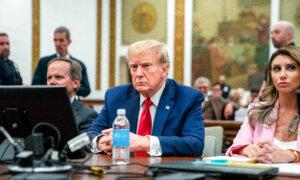The board is a bipartisan one made of an equal number of Republicans and Democrats, who voted unanimously to dismiss the challenge.
The board is a bipartisan one made of an equal number of Republicans and Democrats, who voted unanimously to dismiss the challenge.
Board member Jack Vrett said the axiom “hard cases make bad law” applied to this case.
“If we exceeded our authority … and looked at the underlying of conduct … I think what we would see would be an opening of floodgates of litigation,” he said. For example, every school board candidate could then challenge their rivals over alleged criminal conduct and require election boards to investigate.
“The relief that petitioners are seeking is one of ballot forfeiture” and they had not met that threshold, he added.
Board member Cristina Cray was the only other member to make a statement, wanting to add to the record that she was a Republican but that “there’s no doubt in my mind” that President Trump engaged in “insurrection.” She said she did not think the board had the jurisdiction to rule on such an issue.
The decision can be appealed to state court, and general counsel Marni Malowitz provided several notes during the hearing meant to streamline the decision and prevent a lengthy process should the case be remanded to the board by the court, she said.
Ms. Malowitz had advised the board that even if it didn’t have authority to analyze constitutional issues, it had statutory authority to put the eligible candidates on the ballot. She said she was not convinced President Trump had filed false papers. She added that several issues needed determination before the matter of whether of Section 3 constituted insurrection, and recommended the board not touch on that issue.
She recommended that President Trump be certified for the ballot.
The petition was brought on Jan. 4 by activist group Free Speech for People, which has been promoting the legal theory that President Trump is disqualified from running for office because the events of Jan. 6, 2021, constituted an “insurrection” as described in Section 3 of the 14th Amendment, and the Illinois case is one of several it has brought.
Attorneys for the group and for President Trump also made brief arguments before the board vote, with petitioners relying largely on the Democrat controlled January 6 Select Committee report and President Trump arguing that he did not engage in insurrection and the board has no jurisdiction to rule on “insurrection.”
The board also unanimously rejected two petitions against President Joe Biden’s candidacy.
Hearing Recommendation
Days before the vote, former judge Clark Erickson served as a hearing officer while attorneys for Free Speech for People and President Trump presented opposing arguments regarding a petition to bar him from the ballot on the premise that Jan. 6, 2021, constituted an “insurrection” and his participation disqualifies him under Section 3 of the 14th Amendment.
In Mr. Erickson’s written recommendation, he relied heavily on other state courts’ decisions in similar cases. No state decision is binding on another, and officials have raised concerns about states ruling differently on the matter across the country and possibly disenfranchising voters. With this as a concern, several jurisdictions have opted to wait for a decision from the U.S. Supreme Court that is set to come on Feb. 8.
“Illinois law, including the Supreme Court decisions of Goodman and Delgado prohibit the Election Board from addressing issues involving constitutional analysis,” he wrote before recommending the motion to dismiss be granted.
Given that the board is not obligated to follow the general counsel’s recommendation, Mr. Erickson then outlined why he believed President Trump should be removed if the challenge is assessed on its merits—whether he is disqualified for engaging in “insurrection” under Section 3—largely echoing the Colorado trial court’s rationale.
Mr. Erickson wrote that he relied on the evidence presented in a Colorado trial court that first determined the events of Jan. 6 to be an insurrection, namely the January 6 Select Report and testimony from sociology professor Pete Simi—who has authored publications such as “Far Right Terrorism in the United States” and “An Essay: Understanding the Threat of Right-Wing Extremism”—posed a theory that President Trump was communicating with such extremists with coded language. He dismissed President Trump’s call for peace in a way similar to the Colorado trial court as well.
“The Hearing Officer determines that these calls to peace via social media, coming after an inflammatory tweet, are the product of trying to give himself plausible deniability. Perhaps he realized just how far he had gone, and that the effort to steal the election had failed because Vice President Pence had refused to accept the bag of fraudulent electors. It was time to retreat, with a final tweet telling the nation that he loved those who had assembled and attacked the caitol (sic),” the recommendation reads.
Original News Source Link – Epoch Times
Running For Office? Conservative Campaign Consulting – Election Day Strategies!


